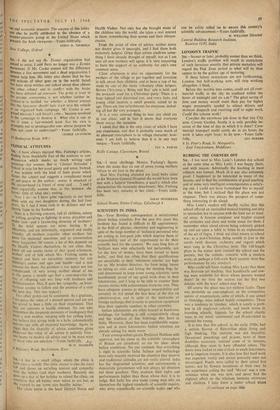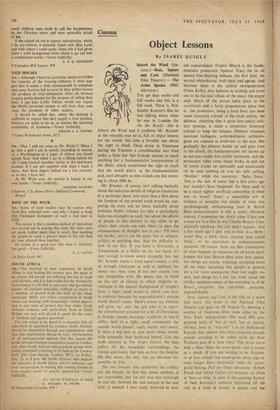RUBBING THE CORNERS OFF
SIR,-1 too went to Miss Laski's London day school at the same time as Miss Laski. I was happy there, and with reason. Admittedly the teaching in most subjects was formal. Much of it was also extremely good. I happened to be interested in many of the lessons, and to find the combination of good teaching and of some very intelligent contemporaries a satisfy- ing one. I could not have formulated this to myself at the time, but I realised that the place was not stagnant. There was always the prospect of some- thing interesting to do ahead.
Miss Laski's readers will hardly realise ,that this school offered an unrivalled musical training, not only to specialists but to anyone with the least eat or musi- cal sense. A famous composer and teacher trained the orchestra and choir and wrote music for them. I remember when about eleven being solemnly picked up and sat upon a table to listen to an explanation of the art of fugue. I think my chief misery at school was, as a non-Christian. being unable to join in the carols (with descant, orchestra and organ) which were sung in the Christmas term. The full-length plays in the winter term amused the school and the parents, but the summer concerts with a modern work, or perhaps a full-scale Bach cantata, were fine performances by any standard.
Who could tell from reading Miss Laski that there was first-rate art teaching that handicrafts and sew- ing were available for those whose parents wanted them? In my time the seniors ran the first two debates with the boys' school near by.
Of course the place was not without faults. There was probably an over-emphasis on the competitive nature of examinations, some of which, if one aimed at Oxbridge. were indeed highly competitive. There was a tendency to 'crushes,' which is surely a prob- lem in all single-sex schools, and much worse in boarding schools. Appeals for the school charity were, to my mind. sentimental and ill-calculated to interest the young.
It is true that this school, in the early 1930s, had a certain flavour of Edwardian plain living and high thinking. The uniform was not beautiful. Occasional preachings and pi-jaws, most of them doubtless necessary, amused some of its inmates, although they seem to have offended others. The doors were locked at nine o'clock to catch latecomers, not to imprison truants. It is also true that hard work was expected, vanity and sexual precocity were not encouraged. Pupils were called by their actual first names, not by flowery inventions of their own. In my experience calling the staff 'Ma'am' was a con- venience when one was new, and never had the slightest effect on the relations between mistresses and children. I later knew a junior school when (Continued on page 100) small children were made to call the headmistress by her Christian name, and were miserably afraid of her.
If the school set out to repress individuality, which I do not believe, it certainly failed with Miss Laski and with others I could name, Some felt it had given them a solid background from which to go out into a complicated world.—Yours faithfully,
4 Campden Hill Square, W8
U. R. Q. HENRIQUES







































 Previous page
Previous page